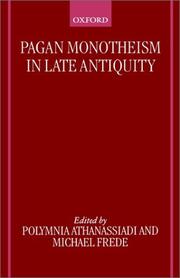| Listing 1 - 2 of 2 |
Sort by
|

ISBN: 1280444762 0191541451 1423769414 9781423769415 9781280444760 9780191541452 9780198152521 0198152523 9786610444762 6610444765 0198152523 1383006326 Year: 1999 Publisher: Oxford New York Clarendon Press Oxford University Press
Abstract | Keywords | Export | Availability | Bookmark
 Loading...
Loading...Choose an application
- Reference Manager
- EndNote
- RefWorks (Direct export to RefWorks)
In this text experts from a range of disciplines address a central problem which lies at the heart of the religious and philosophical debate of late antiquity.
Monotheism --- Religion - General --- Religion --- Philosophy & Religion --- History. --- History --- Rome --- Religion.
Book
ISBN: 1283277603 9786613277602 0520948378 9780520948372 9781283277600 9780520268487 0520268482 6613277606 Year: 2011 Publisher: Berkeley
Abstract | Keywords | Export | Availability | Bookmark
 Loading...
Loading...Choose an application
- Reference Manager
- EndNote
- RefWorks (Direct export to RefWorks)
Where does the notion of free will come from? How and when did it develop, and what did that development involve? In Michael Frede's radically new account of the history of this idea, the notion of a free will emerged from powerful assumptions about the relation between divine providence, correctness of individual choice, and self-enslavement due to incorrect choice. Anchoring his discussion in Stoicism, Frede begins with Aristotle--who, he argues, had no notion of a free will--and ends with Augustine. Frede shows that Augustine, far from originating the idea (as is often claimed), derived most of his thinking about it from the Stoicism developed by Epictetus.
Free will and determinism --- Philosophy, Ancient. --- History. --- ancient greeks. --- aristotelian philosophy. --- aristotle. --- augustine. --- christian thinkers. --- christianity. --- divine providence. --- divine will. --- divinity. --- epictetus. --- epistemology. --- free will. --- greek philosophy. --- individual choice. --- metaphysics. --- nonfiction. --- peripatetic. --- philosophy. --- plato. --- providence. --- rational choice. --- rational self interest. --- religion. --- self control. --- self enslavement. --- spirituality. --- stoic philosophy. --- stoicism. --- theory of assent. --- volition. --- will.
| Listing 1 - 2 of 2 |
Sort by
|

 Search
Search Feedback
Feedback About UniCat
About UniCat  Help
Help News
News